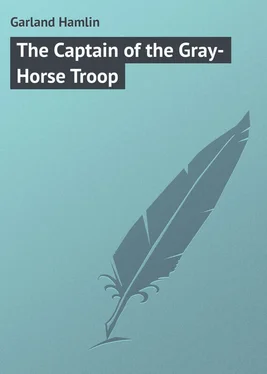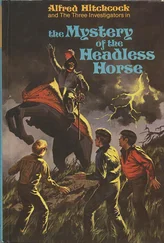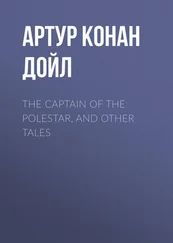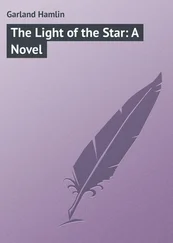Hamlin Garland - The Captain of the Gray-Horse Troop
Здесь есть возможность читать онлайн «Hamlin Garland - The Captain of the Gray-Horse Troop» — ознакомительный отрывок электронной книги совершенно бесплатно, а после прочтения отрывка купить полную версию. В некоторых случаях можно слушать аудио, скачать через торрент в формате fb2 и присутствует краткое содержание. Жанр: foreign_prose, foreign_adventure, на английском языке. Описание произведения, (предисловие) а так же отзывы посетителей доступны на портале библиотеки ЛибКат.
- Название:The Captain of the Gray-Horse Troop
- Автор:
- Жанр:
- Год:неизвестен
- ISBN:нет данных
- Рейтинг книги:3 / 5. Голосов: 1
-
Избранное:Добавить в избранное
- Отзывы:
-
Ваша оценка:
- 60
- 1
- 2
- 3
- 4
- 5
The Captain of the Gray-Horse Troop: краткое содержание, описание и аннотация
Предлагаем к чтению аннотацию, описание, краткое содержание или предисловие (зависит от того, что написал сам автор книги «The Captain of the Gray-Horse Troop»). Если вы не нашли необходимую информацию о книге — напишите в комментариях, мы постараемся отыскать её.
The Captain of the Gray-Horse Troop — читать онлайн ознакомительный отрывок
Ниже представлен текст книги, разбитый по страницам. Система сохранения места последней прочитанной страницы, позволяет с удобством читать онлайн бесплатно книгу «The Captain of the Gray-Horse Troop», без необходимости каждый раз заново искать на чём Вы остановились. Поставьте закладку, и сможете в любой момент перейти на страницу, на которой закончили чтение.
Интервал:
Закладка:
With flushed face and quivering lips she sprang to her feet. "I will not stay to be insulted," she said.
Curtis rose as she swept from the room, but checked his instinctive words of apology and returned to his seat in silence.
Mrs. Wilcox relieved the painful pause by saying, "Captain Curtis, you must not misjudge Elsie. She is a much better girl than she seems."
Lawson was troubled as he said, "She has lashed herself into a great rage over this affair, but as a matter of fact she don't care a hang for Sennett."
"I can't apologize for doing my duty," said Curtis, "even to Miss Brisbane."
"Certainly not," replied Lawson, though he was deeply hurt by Elsie's display of unreason.
As soon as he decently could, he followed her to her studio, where he found her lying in sullen dejection on the big divan. "Bee Bee, you are missing a good dinner," he began, gently.
She was instantly ready to fight. "I suppose you blame me for this scene."
"I think you are hasty, and a little unreasonable. I know Curtis by reputation, and he is above any petty malice."
"You are taking his side against me!"
"Not at all, Bee Bee, I am merely trying to show you – "
"He looked at me as no man ever dared to look before, and I hate him. He thinks because he has a little authority he can lord it over us all here. I shall write to father at once, telling him just how this little prig of a lieutenant – "
"Captain," interrupted Lawson – "for distinguished service."
His smile made her furious. She flung herself back on the divan. "Go away. I hate you, too."
Lawson, at the end of his patience, went out and closed the door behind him. "What is the matter with the girl?" he said to Mrs. Wilcox. "I've seen her in temper, but never like this. She has taken the most violent antagonism to Curtis."
"She'd better let that young man alone," replied Mrs. Wilcox, sagely. "He has a very firm mouth."
V
CAGED EAGLES
The word had gone out among all the red people that the old agent was entirely "cut off," and that a soldier and a sign-talker had come to take his place, and so each little camp loaded its tepees on wagons or lashed them to the ponies and came flocking in to sit down before the Little Father and be inspired of him.
The young men came first, whirling in on swift ponies, looking at a distance like bands of cowboys – for, though they hated the cattlemen, they formed themselves on Calvin Streeter as a model. Each wore a wide, white hat and dark trousers, and carried a gay kerchief slung round his neck. All still wore moccasins of buckskin, beautifully beaded and fringed, and their braided hair hung low on their breasts.
The old men, who jogged in later in the day, still carried blankets, though they, too, had adopted the trousers and calico shirts of the white man. Several of the chieftains preserved their precious peace-pipes, and their fans and tobacco pouches, as of old, and a few of those who had been in Washington came in wrinkled suits of army-blue. The women dressed in calico robes cut in their own distinctive style, with wide sleeves, the loose flow of the garment being confined at the waist with a girdle. As this was a time of great formality, several of the young girls returned to their buckskin dresses trimmed with elk teeth, which they highly prized.
As a race they were tall and strong, but the men, from much riding, were thin in the shanks and bowed out at the knee. They had lost the fine proportions for which they were famed in the days when they were trailers a-foot. "Straight as an Indian" no longer applied to them, but they were all skilled and picturesque horsemen. Lacking in beauty and strength, they possessed other compensating qualities which still made them most interesting to an artist. Their gestures were unstudiedly graceful, and their roughhewn faces were pleasant in expression. Ill words or dark looks were rare among them.
In all external things they were quite obviously half-way from the tepee to the cabin. Their homes consisted of small hovels of cottonwood logs, set round with tall tepees and low lodges of canvas, used for dormitories and kitchens in summer. A rack for drying meat rations was a part of each family's possessions. They owned many minute ponies, and their camps abounded in dogs of wolfish breed which they handled not at all, for they were, as of old, merely the camp-guard.
Such were the salient characteristics of the Tetongs, westernmost representatives of a once powerful race of hunters, whose home had been far to the east, in a land of lakes, rivers, and forests. They were not strangers to the young soldier; he knew their history and their habits of thought. He now studied them to detect change and found deterioration. "I am your friend," he said to them each and all. "I come to do you good, to lead you in the new road. It is a strange road to me also, for I, too, am a soldier and a hunter; but together we will learn to make the earth produce meat for our eating. Put your hand in mine."
He was plunged at once into a wilderness of work, but in his moments of leisure the face of Elsie Brisbane came into his thought and her resentment troubled him more than he cared to acknowledge. He well knew that her birth and her training put her in hopeless opposition to all he was planning to do for the Tetongs, and yet he determined to demonstrate to her both the justice and the humanity of his position.
He knew her father's career very well. He had once travelled for two days on the same railway train with him, and remembered him as a boastful but powerful man, whose antagonism no one held in light esteem. Andrew Brisbane had entered the State at a time when its mineral wealth lay undeveloped and free to the taker, and having leagued himself with men less masterly than himself but quite as unscrupulous, had set to work to grasp and hold the natural resources of the great Territory – he laid strong fists upon the mines and forests and grass of the wild land. Once grasped, nothing was ever surrendered.
It mattered nothing to him and his kind that a race of men already lived upon this land and were prepared to die in defence of it. By adroit juggling, he and his corporation put the unsuspecting settler forward to receive the first shock of the battle, and, when trouble came, loudly called upon the government to send its troops "in support of the pioneers." In this way, without danger to himself, the shrewd old Yankee had acquired mineral belts, cattle-ranges, railway rights, and many other good things, and at last, when the Territory was made a State, he became one of its senators.
Naturally, he hated the red people. They were pestilential because, first of all, they paid no railway charges, and also for the reason that they held the land away from those who would add to his unearned increment and increase the sum total of his tariff receipts. His original plan was broadly simple. "Sweep them from the earth," he snarled, when asked "What will we do with the Indians?" But his policy, modified by men with hearts and a sense of justice, had settled into a process of remorseless removal from point to point, from tillable land to grazing land, from grazing land to barren waste, and from barren waste to arid desert. He had no doubts in these matters. It was good business, and to say a thing was not good business was conclusive. The Tetong did not pay – remove him!
Elsie in her home-life, therefore, had been well schooled in race hatred. Tender-hearted where suffering in a dog or even a wolf was concerned, she remained indifferent when a tribe was reported to be starving. Nothing modified her view till, as an art student in Paris, she came into contact with men who placed high value on the redman as "material." She found herself envied because she had casually looked upon a few of these "wonderful chaps," as Newt Penrose called them, and was often asked to give her impressions of them. When she returned to New York she was deeply impressed by Maurice Stewart's enormous success in sculpturing certain types of this despised race. A little later Wilfred J. Buttes, who had been struggling along as a painter of bad portraits, suddenly purchased a house in a choice suburb on the strength of two summers' work among the mountain Utes.
Читать дальшеИнтервал:
Закладка:
Похожие книги на «The Captain of the Gray-Horse Troop»
Представляем Вашему вниманию похожие книги на «The Captain of the Gray-Horse Troop» списком для выбора. Мы отобрали схожую по названию и смыслу литературу в надежде предоставить читателям больше вариантов отыскать новые, интересные, ещё непрочитанные произведения.
Обсуждение, отзывы о книге «The Captain of the Gray-Horse Troop» и просто собственные мнения читателей. Оставьте ваши комментарии, напишите, что Вы думаете о произведении, его смысле или главных героях. Укажите что конкретно понравилось, а что нет, и почему Вы так считаете.












